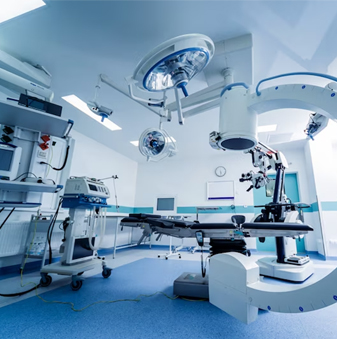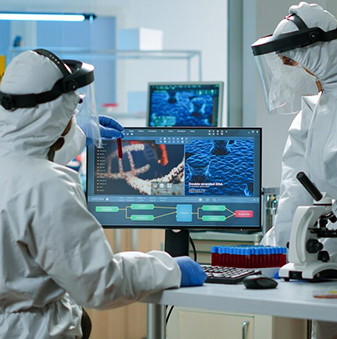Life Sciences & Healthcare
The life sciences, healthcare, and pharmaceutical process chains all depend on clean air, it's always crucial to pick the right filter for a clean room application. In the life sciences industry, where biological life or living organisms are present, it is critical to maintain the highest level of hygiene as well as superior indoor air quality. The filtering system is essential in ensuring the air is free of airborne pollutants, germs, viruses, and dangerous gases from the AHU (Air Handling Unit) to the output. The necessity of Air filters in the life science industry is huge due to its value in protecting hospital equipment as well as patients' and employees' health. We would be unable to manufacture medical equipment, antiviral drugs, vaccines, gene therapies, highly potent drugs, and other life-critical pharma and science products without air filters.

The need for effective air quality in healthcare facilities is highlighted by the presence of vulnerable people and the nature of the current activities. Doctors and Healthcare workers frequently complain of headaches, weariness, dryness, and eye and skin irritation, which have all been linked to poor air quality . HAI(Hospita"The need for effective air quality in healthcare facilities is highlighted by the presence of vulnerable people and the nature of the current activities. Doctors and Healthcare workers frequently complain of headaches, weariness, dryness, and eye and skin irritation, which have all been linked to poor air quality .
Additionally, hospitals run continuously (24 hours a day, seven days a week) with no downtime to recover from the emissions caused by their operations and their subsequent influence on air quality. For hospital and healthcare facility operations, clean air is an essential requirement because it protects patients, employees, and even doctors from airborne diseases and infections, while also providing a comfortable, healthy, and odor-free environment. Hospitals & clinics pay special attention to indoor air quality (IAQ), where they face unique challenges to control airborne pollutants and gaseous contaminants. These objectives can only be met with a filtration system capable of removing even the smallest pollutants from the air. For the past 25 years Spectrum keeps providing the safest environments in hospitals by filtering airborne contaminants.
The state-of-art technology in capturing airborne pathogens makes Spectrum filters the most efficient product particularly in contagious workspace. No of words ? No of sentence ?"l Acquired Infections) can cause delay in recovery of patients and impact patients and healthcare workers. Additionally, hospitals run continuously (24 hours a day, seven days a week) with no downtime to recover from the emissions caused by their operations and their subsequent influence on air quality.
For hospital and healthcare facility operations, clean air is an essential requirement because it protects patients, employees, and even doctors from airborne diseases and infections, while also providing a comfortable, healthy, and odor-free environment. Hospitals & clinics pay special attention to indoor air quality (IAQ), where they face unique challenges to control airborne pollutants and gaseous contaminants.
.jpg)
To ensure patient safety, drug products must be free of bacteria and other microorganisms. Sterile filtration is widely used for microbial removal and is critical in ensuring final product sterility. Spectrum's expertise in sterile filtration solutions with filter products will meet the environment's manufacturing sterility.

Air filters are essential components in the manufacturing of medical devices to ensure the cleanliness and sterility of the production environment. Medical device manufacturing often takes place in cleanroom environments to maintain strict control over airborne contaminants. Air filters, such as high-efficiency particulate air (HEPA) filters and ultra-low particulate air (ULPA) filters, are used in the air handling systems of cleanrooms. These filters effectively remove particles, dust, bacteria, and other microorganisms from the air, ensuring a controlled and sterile manufacturing environment.
.jpg)
Air filters are an essential component in laboratory settings to maintain air quality, protect personnel, and prevent contamination. Laboratories house sensitive equipment, such as analytical instruments, microscopes, and precision machinery. Air filters are used to protect these devices by removing airborne particles and dust that could interfere with their performance or contaminate sensitive samples. Filters are often installed in the air intake systems of equipment or within the laboratory environment to prevent the ingress of contaminants.

Air filters play a critical role in biosafety applications to maintain clean and controlled environments, prevent the spread of hazardous agents, and protect personnel. BSCs are primary containment devices used to handle biohazardous materials, such as infectious microorganisms or genetically modified organisms (GMOs). These cabinets employ HEPA filters to provide both product and personnel protection. The filters capture airborne particles and microorganisms, ensuring that they do not contaminate the laboratory or escape into the environment.



